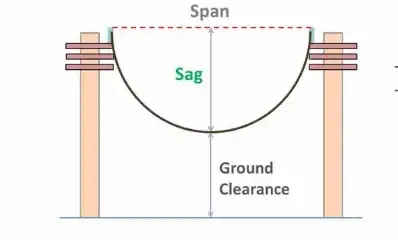While constructing/re-routing any transmission line ,it is mandatory that minimum electrical clearance standards are adhered to for the safety of man and materials and for uninterrupted power flow. Below mentioned clearances are as per CEA guidelines.
1.Minimum Electrical Clearance from the ground

Minimum ground clearance of the conductor from the ground needs to be maintained for safety of life as well as to prevent tripping of the transmission line. In transmission lines if due to any reason sag of conductor increases and the ground clearance reduces below permissible values then it may activate protection relays installed in the line and the line will trip. It is therefore important that minimum clearance values are maintained at all times.
| Voltage Level | Minimum Ground Clearance |
| 66kV | 6100 mm |
| 110/132kV | 6100 mm |
| 220/230kV | 7015 mm |
| 400kV | 8840 mm |
| 765kV | 18000 mm |
2.Minimum Electrical Clearance from Live metal
The minimum live metal clearance is necessary to be maintained and it is to be provided between the live parts and steel work of polygonal pole structure should be as per IS: 5613 as given in Table below.

3.Phase to Phase Clearance
The minimum phase to phase vertical and horizontal clearance is governed by the tower design / geometrical configuration as well as minimum live metal clearances required are under different insulator swing angles. The following values are generally adopted:

4.Mid Span Clearance
The minimum vertical mid span clearance between the earth-wire / OPGW and the nearest power conductor should not be less than the values mentioned in the Table below which means the vertical clearance between earth-wire / OPGW and the nearest conductor under all temperatures and still air condition in the normal ruling span.
| Voltage Level | Mid Span Clearance |
| 66 kV | 3000 mm |
| 110 kV | 4500 mm |
| 132kV | 6100 mm |
| 220 kV / 230 kV | 8500 mm |
| 400 kV | 9000 mm |
| 765 kV | 9000 mm |
(Above maximum flood level)
3050 mm above HFL(Highest flood level) .Suitable clearance in maximum water level condition, above the tallest mast, in consultation with Navigational authorities concerned is taken.